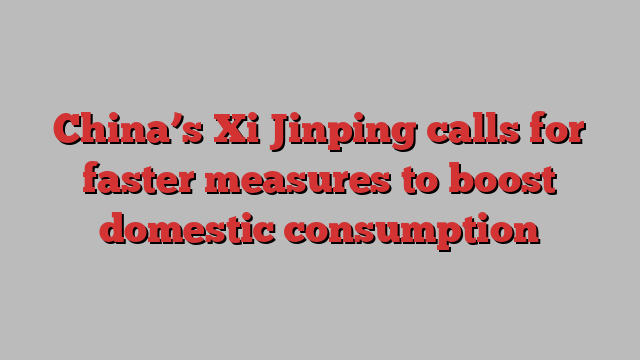
Stay informed with free updates
Simply sign up to the Chinese economy myFT Digest — delivered directly to your inbox.
China’s President Xi Jinping has called for measures to boost domestic consumption to be speeded up as concerns mount that the world’s second-largest economy is falling short of growth targets.
Citing “insufficient” domestic demand, China’s leadership on Tuesday endorsed the acceleration of fiscal and monetary policies, including the use of government bonds to fund spending and stimulus programmes to upgrade industrial equipment and consumer goods.
“The focus of economic policies should shift more towards benefiting the people and promoting consumption,” the politburo, the Chinese Communist party’s senior leadership body headed by Xi, said at the conclusion of a meeting, according to state news agency Xinhua. “It is necessary to increase people’s income through multiple channels.”
The statement added to signals that China’s leadership is concerned about economic growth, which fell to 4.7 per cent year on year in the second quarter, slower than the previous three months and behind its full-year forecast of 5 per cent.
Last week, China announced surprise cuts to policy interest rates, another sign of policymakers’ efforts to improve underperforming growth, which has been hampered by a prolonged slowdown in the real estate market.
On Wednesday, China is due to release its official purchasing managers’ index for July, which is expected to show that factory activity remained subdued.
The exhortations to stimulate demand in the politburo statement came in stark contrast to the message from the Communist party central committee’s third plenum, one of its most important policy meetings that is held once every five years.
Held last week, policymakers at the third plenum focused on longer-term ambitions of ensuring China’s dominance in advanced technology and industry and made little mention of how to increase domestic demand.
China’s trading partners including the US and EU have complained that Beijing is promoting a one-track economy focused on factory exports while not doing enough to promote consumption among its own citizens, whose confidence has been hit by the property sector crisis and fallout from the pandemic.
While the politburo reiterated Beijing’s high-technology plans, it said economic policies should “enhance the consumption capacity and willingness of middle and low-income groups”.
The statement gave no hint of new measures to boost consumption but focused on speedier implementation of those already announced, such as bond issuance and equipment upgrades.
Services should also be promoted in areas such as “culture, tourism, elderly care, childcare”, it said.
Analysts at Gavekal Dragonomics wrote in a note this week that “economic policy and growth in China have again broadly disappointed, with demand losing momentum as attempts at fiscal stimulus, a property bailout and a reform package failed to get traction”.
“The government’s main priority remains its manufacturing- and technology-focused industrial policy,” they added.
The Gavekal analysts warned that China was in danger of missing its economic target this year with a combination of weak demand and ever-higher supply driving disinflationary pressure in the economy.
China’s economy has relied on booming exports — with the country shipping more than $900bn of goods to international markets in the second quarter, up from $800bn in the first quarter and 50 per cent higher than before the pandemic, Gavekal said.
But exports have not been counterbalanced by rising imports, driving tensions with trade partners that could come to a head in November during the US presidential election, with former president Donald Trump warning of sharp tariff increases.